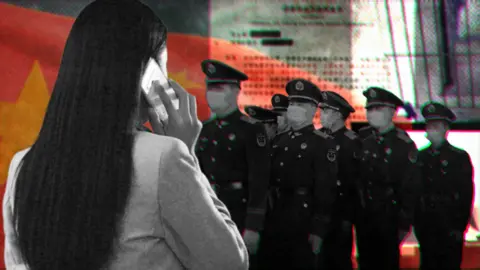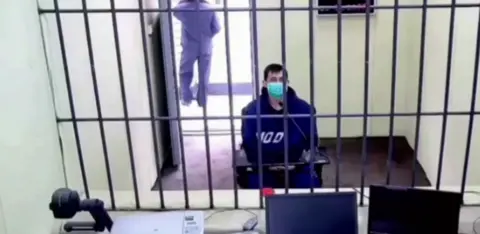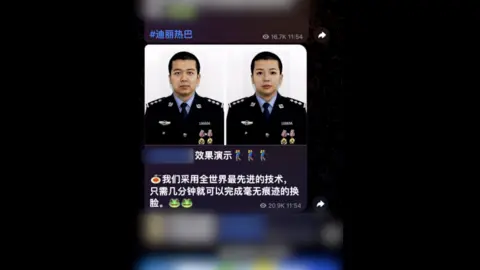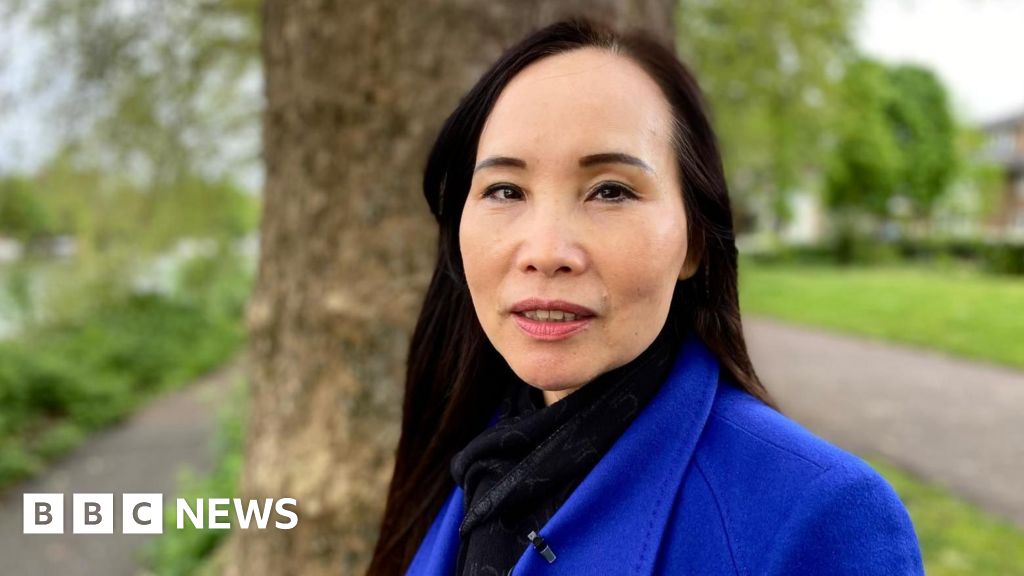By Elaine Chong and Ed Main, BBC Trending
 BBC
BBCChinese people around the world are being targeted by an elaborate scam in which criminals pretend to be Chinese police. A British-Chinese woman has told the BBC that she handed over her life savings to con men who wore uniforms in video calls and gave her a virtual tour of what appeared to be a police station.
Helen Young still has nightmares about the fortnight that she was made to believe she was on China’s most wanted list.
Scammers posing as Chinese police manipulated the London-based accountant into believing she was under investigation for a massive fraud back in her homeland.
Helen was presented with a mountain of fabricated evidence which appeared to implicate her in a crime she knew nothing about.
When the fake police then threatened her with extradition to a jail cell in China, Helen sent them her £29,000 life savings as “bail money”, in a desperate attempt to stay in Britain.
“I feel a bit stupid right now,” she says. “But there’s no chance I can know that’s not real. It’s so convincing”.
Helen’s story may sound extraordinary but there have been numerous similar cases in the Chinese diaspora.
China’s embassies around the world have issued public warnings about police impersonation scams, as has the FBI after a number of cases in the US. One elderly woman in Los Angeles reportedly handed over $3m, believing it would stop her extradition.

Typically these scams begin with the target receiving a relatively innocuous phone call. In Helen’s case it was somebody claiming to be a Chinese customs officer who told her they had stopped an illegal parcel sent in her name.
Helen hadn’t sent anything, and she was told she must file a police report if she believed someone had stolen her identity. Although she was sceptical, Helen didn’t hang up.
“Chinese people like myself because we were born and bred in China, we were taught obedience,” she says. “So when the party asked me to do something or my parents asked me it’s very rare that I will say no.”
Helen was transferred to a man who said he was a policeman in Shenzhen called “Officer Fang”. Helen asked for proof and he suggested they went on a video call. When they connected, Helen saw a uniformed man whose face matched the police ID he flashed.
Officer Fang then used his phone to give her a tour of what looked like a fully functioning police station with several uniformed officers and a desk with a large police logo.
“That moment all my suspicions are gone. So I say: ‘I’m sorry, I just have to be careful nowadays, there are a lot of criminals out there’,” Helen says.
While they were talking, Helen heard a message on the tannoy in the background, telling Officer Fang to take a call about her.
Officer Fang put her on hold and when he returned he was no longer interested in the illegal parcel. He said he had been informed that Helen was suspected of involvement in a large financial fraud.

“I said: ‘That’s nonsense’. He said: ‘Nobody says they’re guilty. So it’s the evidence that counts’.”
Helen was shown what looked like a bank statement for a vast amount of money in her name. Officer Fang told her that if she was innocent she must help them catch the real crooks. He made her sign a confidentiality agreement promising not to tell anyone about the investigation. Helen was warned that if she did, she would get an extra six months in prison
“He said: ‘If you tell anyone you have been interviewed by the Chinese police, your life will be in danger’.”
The scammers also made Helen download an app so they could listen in to what she was doing day and night.
Over the next few days, Helen tried to act normally at work. She spent her evenings working on a personal statement that she was ordered to write, detailing every aspect of her life.
Then Officer Fang called back with the news that several suspects were now in custody. He showed her written statements in which several people accused her.
Helen was sent a video which appeared to show a male prisoner confessing to police, and naming her as his boss in the fraud.

We have taken a closer look at the video, and because the suspect is wearing a large Covid mask, it’s impossible to tell if what you’re hearing matches his lip movements. It would be easy to add a fake soundtrack that mentions Helen’s name or another victim.
But for Helen – who had been convinced she was dealing with genuine police officers – the effect was devastating: “After I heard my name like that I was vomiting. It convinced me I was in deep, deep trouble.”
Helen believed Officer Fang when he then told her she would be extradited to China – even though she’s a British citizen.
“He told me: ‘So you got 24 hours, you pack your bags. The police are coming to take you to the airport’.”
Helen was told she could halt her extradition if she could raise bail. After sending over her bank statements for inspection, she was told to transfer £29,000.
“I felt terrible, because I promised my daughter to give her money for her first flat,” Helen says.
But a few days later the fake police were back. Helen was ordered to find another £250,000 or be extradited: “I was fighting for my life – if I go back to China, I may never come back.”
After Helen tried to borrow the money from a friend, he alerted her daughter. Helen broke down and revealed everything. But not before she had put her phone in a kitchen drawer and taken her daughter into a bedroom, and put a duvet over their heads so the scammers couldn’t listen in.
Her daughter listened patiently and explained it was a scam. Helen’s bank eventually refunded her money, but her ordeal could easily have had a bleaker ending: “For two weeks I hardly slept. How can you sleep when somebody is monitoring your phone?”
In her sleep-deprived state, she crashed her car twice. On the second occasion, she wrecked it entirely: “I didn’t kill anyone, but I could have. These types of criminal scam could kill people.”
Other victims of police impersonation scams have been pushed to even greater extremes.
In some extraordinary cases, some Chinese foreign students who can’t meet the financial demands of the fake police have been persuaded to fake their own kidnappings in order to seek a ransom from their families.
Detective Superintendent Joe Doueihi of New South Wales Police fronted a publicity campaign to warn about so-called virtual or cyber-kidnappings, after a series of cases in Australia.
“Victims are coerced into making their own video of them being in a vulnerable position, to appear as if they’ve been kidnapped – tied up with tomato sauce on their body to make it look like they’ve been bleeding, and calling for help from their loved ones,” he says.
 New South Wales Police
New South Wales PoliceThe students are then ordered to isolate themselves while the scammers send these images to families back in China, with a ransom demand.
The scam victims may also find themselves being manipulated into helping to scam others.
“Scammers will trick a victim into believing that they are working for the Chinese government. They will send them documentation and swear them in as a Chinese police officer,” Det Supt Doueihi says.
He says the victim – who may have already handed over money to the criminals – is sent to monitor or intimidate other Chinese students in Australia.

Many of these frauds are thought by experts to be run by Chinese organised crime groups operating from compounds in countries like Myanmar, Cambodia and Laos.
Chinese state media has reported that tens of thousands of suspects have been returned to China over the last year.
Awareness of these types of scams is growing. We spoke to a student in Japan who realised he was being targeted by criminals, and recorded their conversation.
He asked not to be named, but shared the recording with the BBC. In it, the scammers tell him that if he revealed anything about the call to anyone, then he would be jeopardising the “investigation”. He refused to hand over any money and they stopped pursuing him.
He’s aware that he had a lucky escape: “I never thought it would happen to me. Just be really careful when you get a call from a number that you don’t recognise.”


